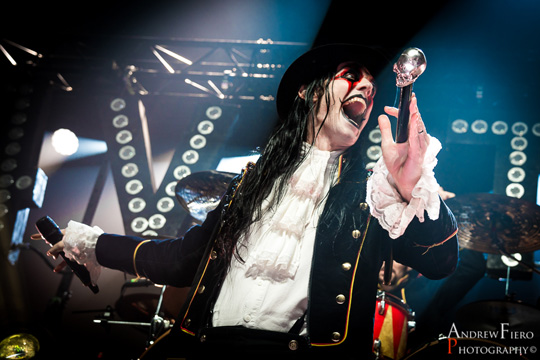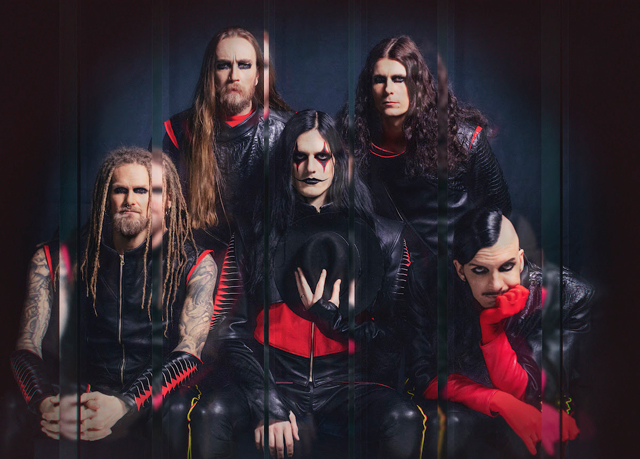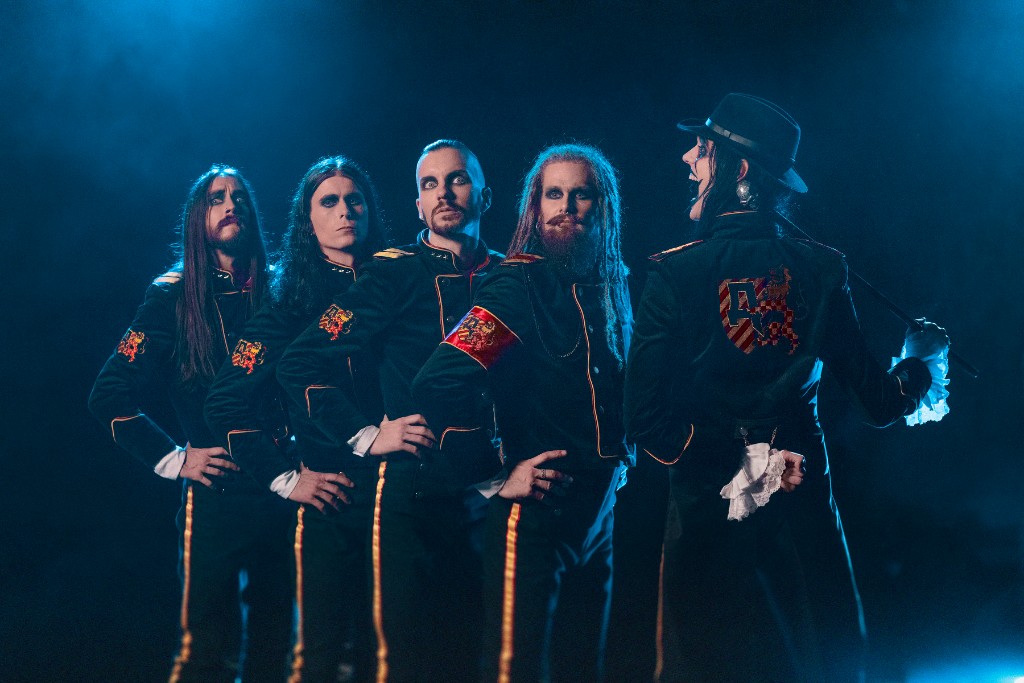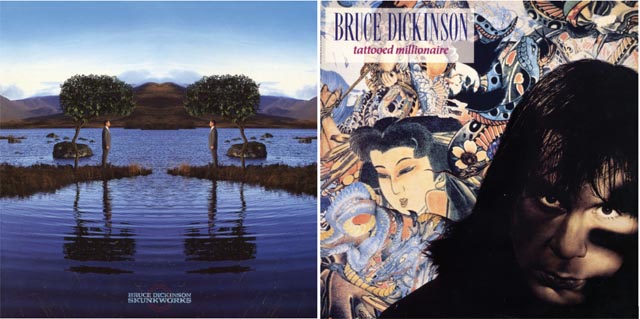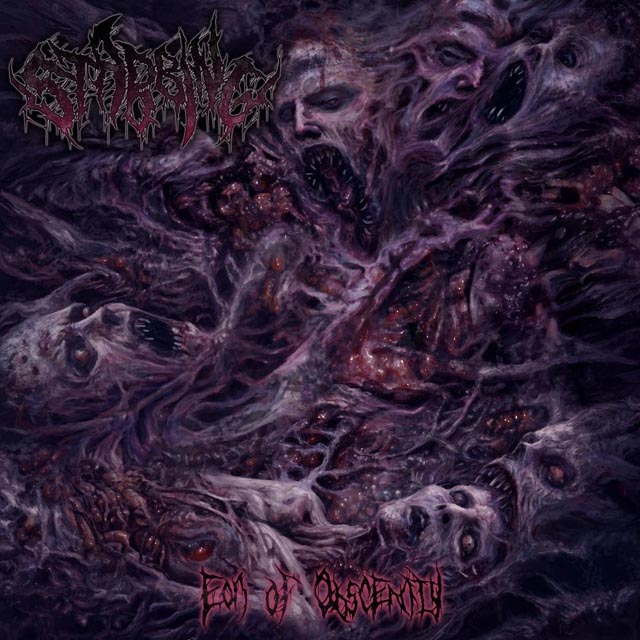![]()
Avatar continues to reinvent the wheel as they went from lighthearted humor with Avatar Country to dark and bleak with their upcoming album, Hunter Gatherer, which will be released on August 7th via eOne (pre-order here). We caught up with vocalist Johannes Eckerström to discuss their latest effort, the band’s return to darkness, missing concerts, wisdom from Jim Carrey, and more.
Hunter Gatherer sounds like a complete 180 from Avatar Country. Can you talk more about going in a darker and different direction?
What I think it really is, is that some fans and people around me have talked about us going in a way that we’ve been going back, to something pre Avatar Country. To me, it’s not so much that we went back to something, what I feel we went back to was a fork in the road where we just ended up at some point and took a turn where we became more and more humorous with what we were doing. It kind of started with the Feathers & Flesh already, although subject wise, on that album, if you really listen to it from start to finish and go on that trip, it’s not a whimsical happy album per se. But the seed was planted there when we decided to do a metal song about bees singing, “You got to, got to work, work, work, work, you got to work.” So the seed was planted there.
Then in the process of making music videos, some of them, we had some awesome, funny ideas that we decided to do, like for New Land, and Avatar Country was an all in on attempting humor, just decided to make an album out on a bunch of concepts and things that we made each other laugh with, and that was because that was what we felt the most drawn to do at that time. So now the thing with Avatar Country, that is, having said that we got that completely out of our system, where now we’re at the place where we no longer, at this particular time, we don’t want to play with humor at all. Like with Feathers & Flesh, we dipped our toes there a little in something that was overall darker and more serious.
But now since we did something based completely on something that, to us, was very, very funny. Then there’s no need to be funny right now. Also, psychology wise, the whole thing of processing your life, your feelings, your ideas, your anxieties, everything, and the form of art. I took a two year hiatus from processing life through art in that way because we decided to do this funny, whimsical, love letter to heavy metal, and I think that made the darkness even more compact and more tied, more rooted in this world. There was no need for that kind of metaphorical storytelling that the fable of Feathers & Flesh was.
Speaking of putting dark and anxiety experiences into this album, can you talk about some of the themes?
Well, there’s a big umbrella with a theme. A hunter gatherer is, of course, what we were, human existence for, I guess for most of it. The longest time that we’ve been here on earth, we were Hunter Gatherers. That is what evolution wired us to be. Biology brought us to that place of living in those small tribes. Living in nature, with nature, we all probably looked like MMA fighters physically. On an individual level, probably lived some life that for our brains, for our beings, was quite optimized.
Then agriculture happened, we were tamed by the wheat and with that came great success for us as a species, but there started to be more of us. But at the same time, it was to the detriment of the individual. Arthritis started to happen, and back problems started to happen because we started to do more monotonous grinding work instead of climbing trees, digging in soil, chasing rabbits, all these things, this dynamic life of the hunter gatherer became more monotonous. Our diet became less varied. You start to have more children, more often, feeding them more other things than breast milk earlier. We got sicker. We built food storages, more dependent on fewer food items. So it had to be the storages. Those storages you could steal from them, conflicts increased, desiring what your neighbor had increased, but all in all, if you look at the way, if we would study another animal, it was a great success because there were more of us.
You can trace these kinds of development, all of these steps forward for the species that might ultimately be something that has been detrimental to the human spirit, all of the way up until the Industrial Revolution and this information age. It’s really only probably in the last hundred years or so where this has been turning around, where now we’re at a place where life for individuals has started to become massively improved all over the world, which is a good thing. But at the same time, we still face the challenge of fighting. The world we’re building for ourselves is now so detached from the world for which we were evolved to exist in, and that is happening faster and faster and faster due to technology, due to the digital age, and we have to figure out how to deal with that.
At the same time, we have to solve a whole lot of things, more than anything, I would say environmental problems, climate issues, and it has to happen fast. That’s the scary part. Things are starting to derail quickly. It seems to me like they are coming at an accelerated pace. At the same time, there’s no solution in going back to something, it wouldn’t work. We can’t all suddenly move into the forest and put on just wear a cloth around our hips and it would be Eden again. No, we’re too many, we’re too detached. It’s too different. Our solution lies ahead of us and we need to hurry. That’s scary because both our salvation and damnation are both tied to acceleration, and that is … Studying the human condition, dealing with personal experiences, asking searching questions around this, it kind of shapes the tone and the themes of the whole album in one way or another throughout.
It’s a coincidence that these subjects are hitting us now questioning a possible downfall of our future, especially with the COVID-19 pandemic. It makes you question even more on what the future is going to look like. It’s very scary. What was the experience like for you so far promoting a new record during a pandemic?
Well, I can’t complain. The thing is, the fact that we have to cancel so much and for us canceling meant not even announcing, because we had a big plan in place for this fall. But the shows that were meant to happen that got canceled for us, they will only start to appear in my calendar in a couple of weeks. I would have been home now anyway. I would have taken a few more flights to at least some different cities in Europe. I’d probably also go to the States as well, to promote in person. That would have been cool. But in hindsight, maybe it’s nice that we’re not flying in so many places in general. Like with any kind of office work, it proves how much you can do without going somewhere right now.
This means that I have been here at home and we live in a place where, you know, nice parks and water and stuff around us, but it’s nice to go out every day and just see winter turn to spring turn to summer, which due to the fact that we travel so much with a band, I’m no longer used to having seasons come to me. I travel to different seasons most of the time. So that has been groovy in its own right. Then you say, you feel this sense now of worrying about the downfall of everything with what’s going on now. I’m positive that, again, species wise and everything, this is not the one that will break us. We’re going to be fine.
That statement, I know I’m right now disregarding personal tragedies connected to this pandemic, I’m talking about the big picture. We’re going to be okay. I just listened to this … Michael Greger, a scientist released some books on the subject of pandemics and other things. From smart educated people like him, from their point of view, this was a good practice round. This was a nice, easy one for governments to stress test their assistance and learn from it accordingly. People like him, they are waiting for the big one, the really big one. They claim to already know where it will come, and it’s our chicken factories, and what blew my mind there is that every single disease like this pandemic, from measles to, well, to COVID-19, is all in one way or another … Like it’s all tied to our domestication of animals. For these viruses to evolve and jump from one animal to another completely different species, we need to live and have them live in bad conditions and us to live too close to each other in filthy conditions. That’s how that jump happens. It has always been tied to domestication of animals. So yeah, like there are a lot of things that we can learn from this if we are willing to, and that, to me, seems like the big one, is basically if you eat more carrots instead. If we do that collectively, we might have a shot, and that blows my mind.
It’s definitely a learning experience. Can you tell me which songs were more challenging to write on The Hunter Gatherer?
There’s one. “Gun” was the most challenging because I had most of that for years and I mean, years. I’d say it’s probably more than a minimum, seven years old, a good chunk of that song. It’s a simple song to play. Hard to nail because it’s so dependent on … To make good music out of vulnerability and stay in the pockets and speak in that state is really hard for me, but that remained unfinished for years and years and years. Especially John [Alfredsson – drummer] kept coming back to that one, “Dude, whenever you finish that one, that’s on whatever album we’re doing.”
No, but that took years. It was basically different variants. The main theme on the piano was there from day one. The vocal melody for the verses was there since day two, together with one version of those lyrics or another. But I guess I’ve written more verses for that song than the verses combined for all other songs on this album. Usually our music is more aggressive, more violent. It’s a different kind of force usually, it means that this was new territory, and you want me to do something like that, you want to have that be as good as any of your extreme stuff, the heavy stuff to have it motivated a place there, and it can’t just be that, “Oh it’s a softer song. Oh, I guess this is the ballad. Okay. This is the quote unquote, chick song,” which is stupid because the girls in on our show mosh just as hard as anyone.
But when you come up with an idea like that, it can easily be tainted that by some ballad thinking bullshit that doesn’t really belong in what we’re doing. To craft something that really belonged on an Avatar album with so few parts and such a gentle touch, that was hard, but a good kind of hard. I want it to be hard, one way or another, to make an album every time. You want something where you are beginning to write it.
I do like this darker sound of Avatar. How would this change the look of your live set?
It will, of course, change the whole presentation or chunks of it. Like we are a theatrical group and when we go to our back catalog and play stuff live, you want to integrate the ideas and the mindset around those songs, into the vibe we have now, and find a good balance between. Evolve the whole live show as a whole, but still, throwbacks are throwbacks. I always think being a kid, watching some Michael Jackson video back then when he did Smooth Criminal, he wore the white jacket from the music video, you know? So in terms of the whole framework for it, the way we talked about it is that what we did with the Avatar Country stage wise could be described as pornographic in the sense that was all very in your face. It wasn’t about nuances. It was about go, go, go over stimulation.
Then I would say that the new way of thinking for this would be more in line with eroticism. That is to really create something that also makes more things happen in the audience’s mind, and that hopefully therefore hits deeper to create atmosphere for things to happen rather than having a lot of bells and whistles. Then still, at the same time, when it’s called for, have the right kind of bells and whistles. But yeah, the whole setting, the whole vibe will be more darker. Like, I guess you want to create a framework that does justice to the current album, while at the same time, creates space where there’s room for whatever you’ve done in the past.
You guys are definitely very theatrical live. With concerts being on hold for who knows how long, do you guys have any plans for like a record release live stream?
We’re talking about different things to do. It’s a bit up in the air now, exactly what we want to do around the time of release. There’s one factor, is that I am in Finland, since I’ve been living here for the last six years, almost, and the rest of the band is in Sweden, which is, that’s a one hour plane ride when you can travel. That has changed a whole lot of things about our work right now. I bought a green screen and we’ve been very creative with how to shoot music videos, although it turns out amazing, miraculously enough. So that kind of effect that we can really be in the same place easily now, anyway.
But it’s also, I don’t know, I have some issues with … You’re looking for something to take the place of a live show, but the thing is, for a metal show, if I don’t see the sweat turn into steam off the shoulder of some big dude in front of me, if there’s not that smell of spilt beer, BO, and that contact, if I can’t really look the audience in the eyes, and they can look me in the eyes, it’s not a show. The life setting is … Yeah, it’s a visual, but it’s also, it’s something much more physical that gets lost in … and anyway, and the live stream can’t take its place.
The closest you get to is when you do multi-angle, proper live shows with an audience there. Nothing can take the place of the audience. We can stand and play in front of something. But I feel like what we’re looking for and work it’s complicated . What will do the music that we created and that we had special intention on how it’s supposed to be presented and on what will do that the most justice? So instead of we are doing Q&A live streams on the Avatarcountry.com and also on YouTube and Facebook in general, try to think of other special ways to stay in touch and interact with people in the meantime, and just keep the band alive and active and out there in a way that makes sense and that feels very personable and honest. I think we are inclined to have that be that we bide our time doing that and save playing live for the day when we can actually play live and have that mean so much more.
No, of course, it is strange. As much as I appreciate seeing live streams, as you pointed out, you’re missing that natural energy from the crowd.
Yeah. Let me just also make it very clear that this is how I feel about, we feel about it, personally, and about what is right for us. I have watched an occasional live stream of people playing and enjoyed it for what it is. There is absolutely no right or wrong at this time for how to handle this, how to deal with this and how to express yourself as an artist. That’s up to every band to decide how they want to do things, and then up to their audience to feel however they feel about it. So by sharing my reasoning around it, which I speak for the band, I don’t want to throw any shade on anyone who does it differently.
No, of course. Speaking of going back to concerts, we read all sorts of random articles about what the future of shows would look like. We could have to wear space suits to inflatable bubbles and who knows what else. What’s your thought on what POST-COVID shows would look like?
I think ultimately we’re going to go back to normal. I absolutely believe that science will catch up eventually. That’s what science does, but the scientific method, which is, I guess might be the coolest thing we invented per se, is just to formulate the scientific method of thesis, testing, peer reviewing, formulating theories, that whole process, I think in itself, and what path that has led us down to is … and I trust … Like this album, the mantra for me with this album was trust the process. Like we made sure to have more time writing it and work on the songs and then have some space where we didn’t work on the songs just to keep hearing them fresh over and over. But, it was more spaced out this time compared to the last two we did, which was very helpful to just uncover for ourselves, the intention of what we were doing.
The same thing goes for science, I trust the process. So that part is going to be fine, like this particular pandemic, will be dealt with like pandemics in the past. The problem is that that new one will come, and a new one will come, and a new one will come. That is, as long as we have the death factories and keep doing what we do to domesticated animals, it will happen again and again and again, and it could be way, way, way worse than it is now. That frustrates me. But in between there, between one catastrophe and another, there will be a period where, again, we all get to bury our faces in someone’s armpit while moshing and going crazy and being in that room with this weird sense of anticipation and tension and almost danger and that ultimate release. We will get to share that with strangers. I have no doubts. In time.
We’re all missing shows. Is there anything else that you want to say or add about the album?
Again, like on the surface, it’s our darkest, heaviest, most serious album in a long time. If you dig a bit deeper, it’s our darkest, heaviest, and most serious album in a long time. We can talk all day long, and I can talk all day long about the intentions behind things, all the thoughts that went into writing these songs. All of those things, ideas, theories are useless without the riffs to back it up and we have made something that might be the best thing we’ve done yet, if you ask me. That’s the only feeling I’m looking for every time. Everything else, everything else, no matter how important and passionate I am about it, is extra to the fact that we made some bone crushing riffs and added screams to the choir of screams and on the Mount Olympus of metal, adding ourselves to the conversation, and I proudly have this album stand tall amongst everything else that goes on in metal right now. It’s all about the riffs man.
It’s a great album and a wonderful change in a way. It surprised me because I saw the humor in Avatar Country and thought it was hysterical, and then I see this darker album, and it’s amazing that you guys continue to be this inventive, whether light or dark.
Thank you. Well, that’s the thing, right? We did one funny album and it was fun and it was great. It wouldn’t have been funny to do another one. Like we had material and passion for the ideas for one album, and I have no idea what we’re going to do after this one. That’s also the beauty of it. It moves, it lives. I saw an interview with Jim Carrey, of all people, I guess it was him talking about his father and just having some tough times while he grew up. One thing that made him really know that he would pursue show business was that he had learned that sadly you can fail at something you don’t want to do. So then it might be better to fail at something you actually wanted to do to choose just what life you want to live. That is our whole philosophy with our music always, that I don’t know what’s the most commercially viable thing for Avatar to do, and we don’t really care. We know Avatar is a metal band and that’s about it. But beyond that … which anyway has seemed to be the most rewarding way for us to work, has been to make exactly what we want to do. In metal, it seems that honesty pays off.

